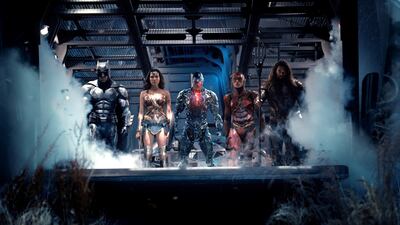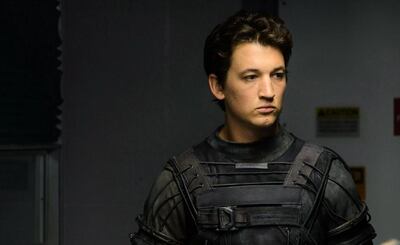"One misses the days when one's biggest concerns were exploding, wind-up penguins," intones Jeremy Irons' Alfred Pennyworth in Zack Snyder's new movie Justice League. In a superhero film featuring Wonder Woman, The Flash, Cyborg and more, it is a sly nod to Tim Burton's Batman Returns, wherein Danny DeVito's Penguin was all Gotham's Caped Crusader had to cope with. It is also an inadvertent reference to how bloated superhero movies have become.
The DC Extended Universe has so far brought us five movies, including Batman v Superman: Dawn of Justice and Suicide Squad. The Marvel Cinematic Universe, which began with 2007's Iron Man, now numbers 17 films. The most recent, Thor: Ragnarok, has so far grossed US$655 million (Dh2.41 billion) after just a fortnight on release. Justice League is currently tracking at a healthy $110m for its opening weekend in the United States.
Others in the Top 10 list for 2017's highest-grossing movies include Marvel's Guardians of the Galaxy Vol 2 and Spider-Man: Homecoming and DC's Wonder Woman. Nestling just outside the Top 10 is Logan, a more adult take on Hugh Jackman's hirsute Wolverine character (from the franchise that kick-started the modern-day thirst for superhero movies 17 years ago, with the release of X-Men).
What is remarkable is how these films seem immune to either audience fatigue or poor reviews – the villain-driven Suicide Squad grossed $745m last year, despite a critical kicking. The MCU currently has Black Panther, starring Chadwick Boseman, due in February, followed by Avengers: Infinity War and Ant-Man and the Wasp. A further four films, including the first outing for Brie Larson in the titular role in Captain Marvel are scheduled up to 2020.
The DCEU is just as busy, with Jason Momoa's Aquaman – his character is currently getting wet and wild in Justice League – getting a stand-alone movie next year. Likewise, Ray Fisher's Cyborg will strike out on his own in 2020. Even characters that have flopped are being given a second chance. Green Lantern Corps is being readied for a reboot, despite the mess made of the 2011 film with Ryan Reynolds (which still took $219m across the globe).
It doesn't stop there. Sequels to Wonder Woman and Suicide Squad are in the works, as are solo outings for major icons such as Ben Affleck's Caped Crusader in the Matt Reeves-directed The Batman and minor characters such as Deathstroke (who briefly appears in Justice League, if you stay to the end). With such forward planning, the studios have pushed all their chips towards all things spandex, but surely this all-year, every-year approach has to end soon?
"I think as long as everyone is trying to show people something they haven't seen before, people will always want to see that," argues Jon Watts, director of Spider-Man: Homecoming. Indeed, while the DCEU has yet to really find its groove, Marvel has repeatedly freshened things up – never afraid at taking risks, whether it was on the rag-tag Guardians characters (including a talking raccoon and a monosyllabic tree named Groot) or bringing in offbeat directors who favour improvisation, such as Taika Waititi (for the latest Thor).
The advance of visual effects has allowed the visions created by comics maestros such as Stan Lee and Jack Kirby to be fully realised. While Richard Donner's 1978 film Superman with Christopher Reeve trumpeted that a man could fly, the wirework was rudimentary compared to what can be done today. It has only been with the advent of digital that the screen can be swamped with creatures, such as the insect-like army belonging to the villainous Steppenwolf in Justice League.
It also helps that the comics and graphic novels represent a seemingly endless array of source material, and that these all come with huge inbuilt fan bases. San Diego's Comic-Con International, the standard-setter for all such things, began in 1970 with 300 attendees. Now more than 150,000 people – many dressed as their favourite characters – come through the doors each year, with studios using the July event to screen exclusive trailers and induce near-hysteria via celebrity-stocked panels.
"It's not just for comic book fans at this point … although I think every kid will grow up with comic books," says actor Miles Teller, who starred in Josh Trank's Fantastic Four (the second time around for the Marvel heroic quartet, it was a perceived failure, and yet still made $168m worldwide). "Those movies are making incredible amounts of money, so I think it would be foolish to think there's not still an audience for it."
What suffers is everything else – the so-called "mid-range" movies that studios thrived on in the 1970s are now being pounced on by streaming sites such as Netflix and Amazon.
The formulaic nature of superhero movies also grates. “I just get bored of the fact that I know who is going to win,” says actress Emma Thompson. “I will watch a superhero movie, don’t get me wrong. Sometimes they’re very wittily done. But as you get older, it’s more fun watching something when you don’t know what’s going to happen.”
While edgy films such as Deadpool have pricked the pomposity of the superhero template, it remains to be seen if history will repeat itself. Once upon a time, conservative studios made costly epics such as Cleopatra, the 1963 film that almost bankrupted Twentieth Century Fox. Eventually, audiences drifted, until the arrival of fresh young directors such as Francis Ford Coppola and Martin Scorsese led to an artistic renaissance. It could happen again – then not even superheroes will be able to save Hollywood.
Justice League opens in cinemas across the UAE on November 16
_____________
Read more:
Justice League's Ray Fisher tells us about his Cyborg addition to the team
Film review: Thor: Ragnarok - Taika Waititi puts the "comic" back in comic book
Hollywood honours Marvel Comics legend Stan Lee
Reports: Patty Jenkins to direct Wonder Woman 2019 sequel
_____________


